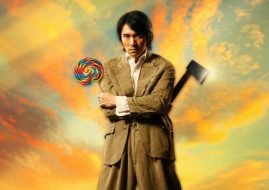Japan Times: Udine Festival 2004
[The Japan Times]
by Mark Schilling
Who are film festivals for, really? The biggest of all, Cannes, is strictly for industry professionals (or rather, anyone with enough connections to wangle accreditation). But many other festivals have turned in a more populist direction, as indicated by the ubiquity of audience awards, which make anyone with a ticket a member of the jury.
For several years now I’ve been advising the Udine Far East Film Festival on its selection of Japanese films. Since it began in 1999, this festival in Udine — a picturesque town in northeastern Italy, about a 90-minute drive from Venice — has focused more on popular cinema than the usual festival fare. It bestows an Audience Award — and only an Audience Award — on three of the 50 or so films it screens over an eight-day period, this year from April 23 to 30.
For a programmer, the obvious strategy for picking a winner is to go with what’s hot, as determined by box-office numbers and message-board buzz. In other words, keep your ear to the ground, not your eye on the Cannes Palme d’Or.
This year the award went to Yoji Yamada’s “The Twilight Samurai (Tasogare Seibei)” — the first Japanese film to receive the prize. I was a bit surprised, frankly — “Twilight” was too well traveled on the festival circuit to qualify as “hot.” Also, for all its awards and honors, including a 2003 Best Foreign Film Academy Award nomination, it lacked the non-stop action that Asian pop-film fans are supposed to crave.
Udine, however, is not the usual Asian pop-film festival. The audience may include otaku with Hong Kong DVDs stacked to the ceiling, but many of its members are locals who like films in general, not Asian films exclusively. Also, the selection ranges beyond Hong Kong actioners to Korean romantic dramas, Philippine erotic comedies and Chinese art films.
This year, from April 16 to 30, the festival screened 56 films at the Teatro Nuovo — a cavernous 1,200-seat structure that also hosts opera companies and theatrical troupes.
One highlight was an 11-film retrospective dedicated to Chor Yuen, a Hong Kong director who was active in the 1960s and 1970s, churning out everything from comedies to martial-arts epics. I was able to see three, including “The Black Rose” (1965), “A Mad Woman” (1964) and “The Prodigal” (1969), shot with a classic Hollywood smoothness, but with bursts of inventive, if quirky, action and purple patches of melodrama that mark them as something different — and original. How many Hollywood directors would have ended the climactic knife fight in “The Prodigal” with a series of stills, like so many kamishibai (picture-play) cards? In the end both opponents fall, die and vanish from the frame with an abruptness and finality that is both absurd and chilling.
Packing by far the biggest punch — or rather firepower — was “Tae Guk Gi (Brotherhood),” Kang Je Gyu’s Korean War epic. Made at a cost of $ 13 million — a record for a Korean film — it tells of two brothers drafted to fight for the South in the early desperate days of the war, when the communists were sweeping all before them. The older brother (Jang Don Gun), a quick-fisted, hot-blooded shoemaker, decides to earn the Medal of Honor — and thereby gain the clout needed to win the discharge of his bookish younger sibling (Won Bin). In the process, he becomes an invincible fighting machine — and loses his humanity.
The battle scenes, shot in a fragmented style reminiscent of “Saving Private Ryan,” outdo the Spielberg film in their in-your-face, all-out violence, including extended sequences of bloody hand-to-hand combat. More than any film I have seen, it conveys the chaos and ferocity of a war that not only ripped the country apart, but scarred its people for generations. Perhaps “Tae Guk Gi” could only have been made half a century after the event. Filmed a generation or so earlier, it might have struck Korean audiences as uncomfortably, even dangerously, realistic, reviving passions that, even today, still seem to be bubbling under the surface.
Also intense, though in an utterly different way, was Li Shaohong’s “Baober In Love.” The title character is a street girl (Zhou Xun) who finds a video tape of a young man (Huang Jie) confessing his anxieties about his new marriage. She pursues him relentlessly — and finally wins him. With whimsical inventiveness, the couple convert an abandoned factory into a dream flat, but soon after their idyll begins, reality — and madness — intrude. Filmed with a puckish, surreal flair reminiscent of Jean-Pierre Jeunet’s “Amelie” (Baober even shares Amelie’s flipped hairdo), “Baober” flies closer to the flame of shojo-manga-esque self-indulgence, as image piles on over-ripe romantic images. But for all its excesses, Li’s film marks an important breakthrough for Mainland cinema, which has been wedded too long to realism, socialist or otherwise.
There was also lighter fare on offer. Among the most watchable was Kwan Chil In’s “Singles,” a Korean comedy about the lives and loves of two young female friends. Designer Na An (Jang Jin Young) has been dumped by her nerdy boyfriend and demoted by her evil boss to serving beers in a restaurant that is a company subsidiary. Meanwhile her pal Dong Mi (Uhm Jeong Hwa) has been running through men the way an allergy victim does a box of tissues, while struggling to start an Internet business. The resulting complications — and defeats — have a ring of truth, but the film’s main attraction is Jang, who is cute enough to make your teeth ache, but has both feet planted winningly on Planet Earth.
One crowd favorite among the Japanese films was “Byoin de Shinu to iu Koto (Dying at a Hospital),” the centerpiece of a four-film retro devoted to the work of Jun Ichikawa. Released in 1991, this film about terminal cancer patients in a Tokyo hospital avoids melodramatic cliche, while capturing, through hundreds of candid shots of ordinary people doing ordinary things, the evanescence and preciousness of life. At the end, the audience, many with tears in their eyes, gave Ichikawa a long, heart-felt ovation. His film was not pop, not “hot” — but it reminded me again why Udine is still a special place.
Until next year . . .
Source: http://japantimes.co.jp originally posted on May 12, 2004
Related Posts
« Sony Classics Acquires Zhang Yimou’s House of Flying Daggers Far East, Far Out »




















